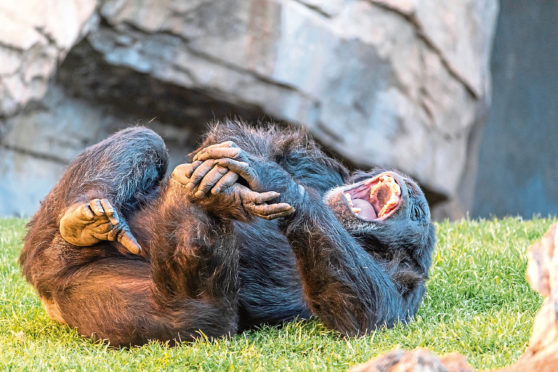
Laughter is the best medicine – or is it?
Professor Sophie Scott, who has spent years working on cognitive neuroscience, is presenting What’s So Funny as part of the Edinburgh Science Festival next month.
Here, she explains to Tracey Bryce the Honest Truth about laughing.
Why do we laugh?
Primarily, for social reasons. We are 30 times more likely to laugh when we are with other people than when we are on our own. We laugh to make and maintain social bonds, to communicate agreement, understanding, recognition, as well as to show we are amused.
Why does laughter make us happy?
When you laugh, you get a reduction in adrenaline – which makes you feel more relaxed – and cortisol, which makes you feel less stressed. You can even tolerate more pain after you have been laughing. So laughter makes you feel better, and this seems to contribute to the ways that we can use it to improve the mood of the group of people laughing.
Is laughing contagious?
Yes. You can catch a laugh from someone and laugh even though you have no idea why they are laughing! Interestingly, we learn to do this – babies do not laugh contagiously – and it remains very social. You are much more likely to catch a laugh from someone you know than someone you do not know.
Is it true that laughing is great for our health?
It’s not bad for us – and it feels great – but you won’t lose weight or get fit that way through laughing. Laughing really hard for 15 solid minutes burns fewer calories than you get from eating an apple. Though if you’re laughing a lot you may not care.
Is our sense of humour genetic?
We don’t know. It would be very interesting to get to find that out. People with different personalities think they laugh differently, so it’s possible that there is a genetic component.
Do couples who laugh together stay together?
Yes! Couples who deal with stress by laughing together not only get less stressed, but are happier in their relationship and stay together for longer. But they both need to laugh.
Is it true humans laughed before they spoke?
Yes! Other apes laugh very much like us, and it seems likely therefore that laughter has an older evolutionary history than modern humans. Of course, that’s also true of human babies, who laugh long before they can talk.
Describe the different types of laughing?
Laughs vary a lot in intensity. Think of the last time you were laughing absolutely helplessly, and compare that feeling to when you make a brief snigger: you can feel that while they share some of the same sounds, they differ in almost everything else.
Spontaneous laughter seems to be very different from communicative laughter. And when we laugh in conversations, there is interesting evidence that we laugh differently depending on how well we know the person we are talking to. And people listening can use this to tell how well we know each other. We also judge laughter based on the context in which it happens. If someone we dislike laughs, we call that something different than a laugh with a friend.
Is laughter really the best medicine?
Laughing does raise pain thresholds. But it’s hard to include laughter in western health care. Maybe we need to pay more attention to the social environments that patients are in, and how that affects recovery.
Do animals have a sense of humour?
Yes, other animals (apes, rats) laugh, when they are tickled or when they are playing. Laughter is not something only humans do. Laughter in other mammals is still linked to physical activities.
Tell us something about laughter we might not already know?
Everyone laughs more than they think they do. We underestimate how much laughter we produce over the day. We laugh a lot and it can be so normal, we almost don’t notice it!
What’s So Funny, Thursday, April 16, Edinburgh Science Festival

Enjoy the convenience of having The Sunday Post delivered as a digital ePaper straight to your smartphone, tablet or computer.
Subscribe for only £5.49 a month and enjoy all the benefits of the printed paper as a digital replica.
Subscribe